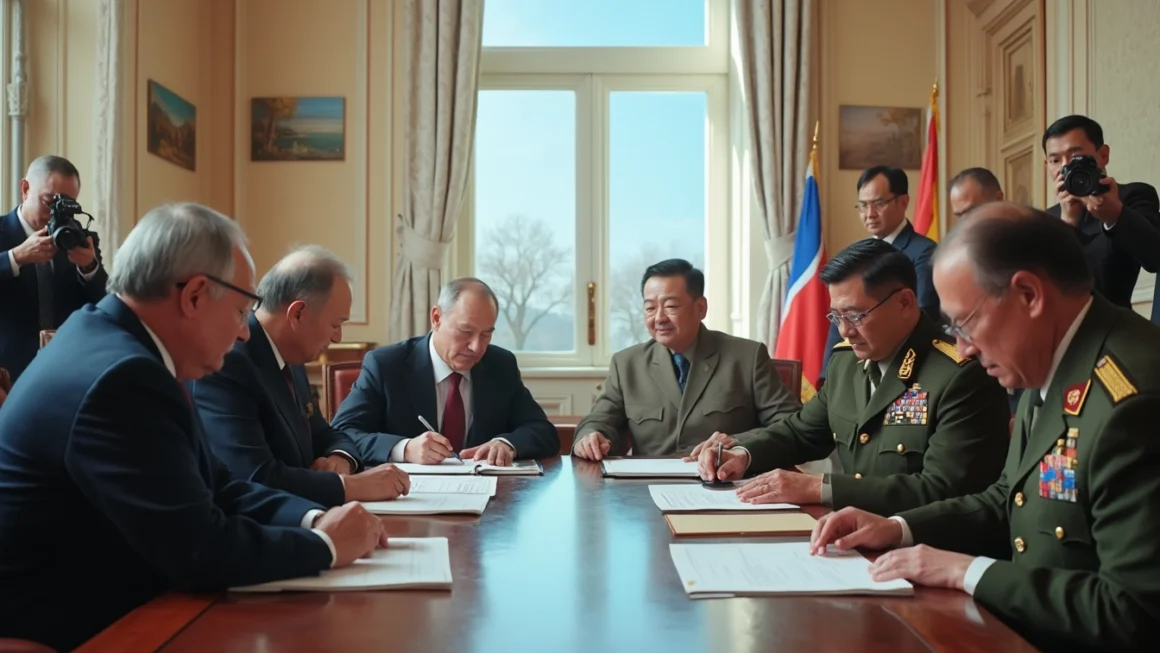The Implications of Russia and North Korea’s Deepening Alliance
Table of Contents
In a significant geopolitical development, Russia and North Korea have recently signed a new treaty, marking a substantial strengthening of ties between the two nations. This move comes at a time when both countries face increasing international isolation, raising concerns among global powers about the potential consequences of this alliance.
Background of the Treaty
The treaty, signed by high-ranking officials from both countries, aims to enhance cooperation across various sectors, including military, economic, and technological domains. This agreement is seen as a strategic move by both nations to counterbalance Western influence and navigate through their respective international challenges.
Key Points of the Agreement
- Military Cooperation: The treaty includes provisions for joint military exercises and the sharing of defense technologies.
- Economic Collaboration: Both countries have agreed to increase trade and explore new economic partnerships.
- Technological Exchange: The agreement emphasizes cooperation in scientific research and technological development.
- Diplomatic Support: Both nations have pledged to support each other in international forums.
Motivations Behind the Alliance
For Russia, this treaty represents an opportunity to expand its influence in East Asia and find new allies amidst ongoing tensions with the West. The country’s recent actions, particularly in Ukraine, have led to severe economic sanctions and diplomatic isolation from many Western nations.
North Korea, on the other hand, sees this alliance as a chance to break out of its international isolation and gain support for its regime. The country has long been under strict international sanctions due to its nuclear program and human rights issues.
International Reactions
The international community has responded with concern to this development. The United States, South Korea, and Japan have expressed particular unease, viewing the treaty as a potential threat to regional stability and global security efforts.
Many analysts believe that this alliance could complicate ongoing diplomatic efforts to address North Korea’s nuclear program and Russia’s actions in Eastern Europe. The United Nations Security Council is expected to discuss the implications of this treaty in upcoming sessions.
Economic Implications
The economic aspects of this treaty are particularly noteworthy. With both countries facing severe economic sanctions, this partnership could provide new avenues for trade and economic growth. However, it also raises questions about potential violations of existing international sanctions.
Experts suggest that this economic cooperation could lead to the development of new automation technologies and industrial processes, as both countries seek to overcome their economic challenges through innovation and collaboration.
Military Concerns
The military cooperation outlined in the treaty has raised significant alarm among neighboring countries and Western allies. There are concerns that this could lead to:
- Enhanced missile and nuclear capabilities for North Korea
- Increased Russian military presence in East Asia
- Potential sharing of sensitive military technologies
Future Implications
The long-term implications of this treaty are yet to be fully understood. However, it is clear that it marks a significant shift in the geopolitical landscape of East Asia and potentially global politics. Some potential outcomes include:
- A new power dynamic in East Asia, challenging the influence of the US and its allies
- Increased difficulty in diplomatic negotiations regarding North Korea’s nuclear program
- Potential shifts in global trade patterns and economic alignments
- A new era of cooperation between nations facing Western sanctions
Conclusion
The Russia-North Korea treaty represents a significant development in international relations. While it offers both countries potential benefits in terms of economic and strategic support, it also poses new challenges for global security and diplomatic efforts.
As the situation develops, the international community will be closely watching how this alliance unfolds and its impact on regional and global dynamics. The treaty underscores the complex and ever-changing nature of international relations, highlighting the need for continued diplomatic engagement and strategic reassessment by global powers.




